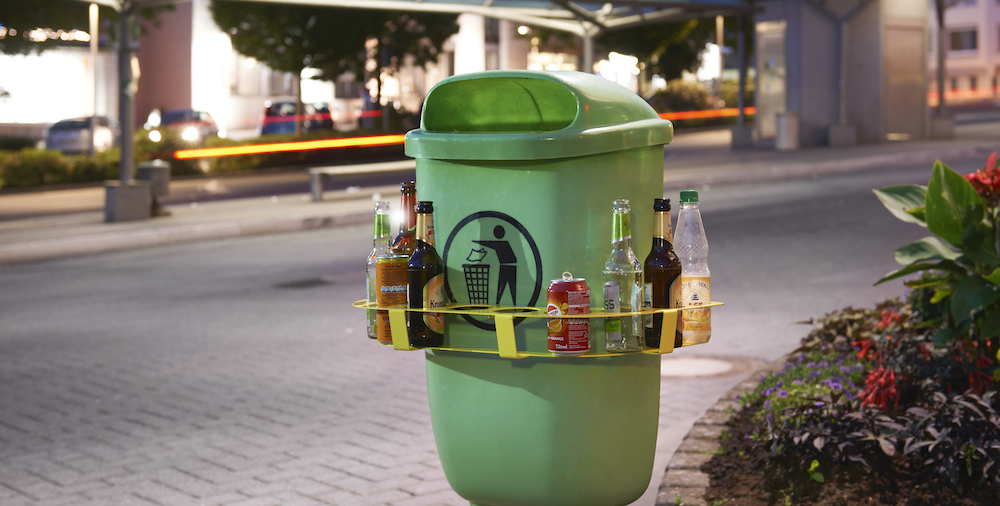I initially wanted to write about the homeless in Berlin because I find it fascinating how even if people are having a rough life, I’ve never been approached by the homeless asking for money or anything else. The reason why is complex. But one of the lighter sides of the issue is how Berliners are always helping them … sometimes even unknowingly.
I was told about this the first night I arrived in Berlin and have been fascinated by it ever since.
Berlin, just like every big city, has a lot of homeless people. Unlike other places I’ve lived, they work for the help they’re getting. Seeing abandoned bottles on the streets of big cities, especially in a country where it’s legal to drink your beer while walking down the street is no surprise. Look away for five minutes and the bottles disappear.
That’s because someone with a hard life is always walking around, picking them up and going to the first supermarket that will take them.
‘Gamification’ of giving to the homeless
This is where the “pfand system” comes in. Recyclable and reusable containers require you to pay a token deposit, an incentive to bring back the bottles and get your money refunded. The amounts vary from 8 euro cents for the 300-to-500-millilitre glass bottles all the way up to 25 euro cents for cans and single-use plastic bottles.
Depending on where you come from this may not seem like much or – to the contrary – it might seem like a lot of money. I’ve been in the bottle return queue quite a few times and most people seem to collect their house-hold empties until a considerable amount has gathered up.
Most single bottles do end up next to the trash bins, though. There are bins that even provide a dedicated space for people to leave their bottles there. Berliners don’t want someone who’s already having a tough time to have to dig through bins.
This “gamification of giving to the homeless,” as I like to jokingly call it, really does work. It takes all the resentment out of it. At least for me. In other cities, I’ve had beggars of all ages come ask me for money since way before I made any myself. Begging can quite often be an organized business, and it disgusts me to think who that money actually goes to and how the needy are treated.
The pfand system, though, makes whoever needs the money work for it. It’s like a real life hidden-object game. If you leave a bottle behind, it will be picked up by someone who needs it. It might be students or people in need, but more often than not, a homeless person. So it takes the direct contact away.
This means you’re no longer getting randomly approached in the street on your way to work or on your night out. You might be asked if you’d like them to take the empty bottle from you, but that’s the extent of it. It’s up to you if you want to give it away or not.
(Editor’s note: Read more here on the DW Generation Change blog about efforts to help the homeless.)
Homelessness in Berlin … it’s complicated
Homelessness in itself is a very complicated social issue. If you’d like to test your survival skills in a safe environment, you can try playing one of the homeless survival games such as Change or Homeless Simulator.
Reading more about the issue of homelessness – seeing the tents, the beds, the curled-up way in which they sleep and feeling the northern winds coming down – I realised how hard that life must be if I’m shaking after walking for just a couple of kilometres.
So I looked it up. Officials at local Berlin charities estimate about 6,000 to 10,000 people currently are homeless with another 30,000 at risk. That’s a lot of people who are in need of support for the winter.
Fortunately, there are local charities that are doing their best to keep the homeless warm and safe:
Kältebus – the Cold Bus
Started exactly 25 years ago, Kältebus was a reaction to a man’s loss in the fight against the elements. Since 1994 the charity has been driving around the city looking for people in need. They have two busses that run most of the night and staff that know what needs to be done. So, if you see someone in need and you don’t feel like you can help, you can call the Kältebus line.
Wärmebus – the Warm Bus
Heat bus available from 6 p.m.: 030 600 300 1010
1 November to 15 March
Daily from 6 p.m. to midnight
Kältebus:
Cold bus available from 9 p.m. on: 0178 523 5838
1 November to 31 March
Daily from 9 p.m. to 3 a.m.
If you’d like to contribute to the charity, you can find the details (in German) on their official page.
Night shelters
There are more than a handful of night shelters where people can turn up or can ask to be driven to by the Kältebus service.
I could make a whole list of places. But really, unless you’re here and in need of one or are looking for a place to give a helping hand to, it’s not relevant. In order to find them you can simply Google “notübernachtung berlin.” This will give you a whole list of places you could make a donation if you choose to do so.
Some of the centres, such as the AWO Night Shelter for Women, have a current list of needs.
This includes public transport tickets and hygiene articles such as shampoo, bandages, tampons, toothpaste, toothbrushes and so on. So, if you receive an unwanted gift in the form of shower gel or shampoo or simply have too many of them, you could re-gift it and make their activity run smoother.
Feminine hygiene, an unmet need
As a side-note here: Female hygiene is a pain and even more so when homeless. Advocacy surrounding the topic is still at different levels around the world. Australia, for example has included feminine hygiene products on the basic needs list, which in turn made them tax exempt.
While the debate still goes on, the fact is menstruations happen every month. Period. Here is a project that is working to provide homeless women and trans men with the basics.
If you feel like giving a hand, you can consider joining events such as the ones organized by the Rise Foundation who go out and give care packages to those who need them.
To sum up, homelessness is an issue that Berliners want to do something about. If you’d like to get involved, all you have to do is look for an opportunity or ask on any of the social media groups. Someone will guide you towards one of the many charities that help the homeless survive the long, cold dark nights. You can help whenever you want. Homelessness is a 365-days-a-year issue so you can get involved any time.
If you feel like helping, there are many ways in which you can get involved. You can lend a helping hand, donate your unwanted Christmas toiletries or donate some money to enable the charities to keep doing a great job.

About the author:
Meda Harsan has a passion for travel and writing. She has a background in television, financial and IT services. Meda brings her critical eye and wit to everyday life.
She’s taken a break from a career at some of the world’s biggest corporations to explore the globe and herself.
Meda has lived in the United Kingdom, Australia, Poland, Romania and is now living in Berlin.














